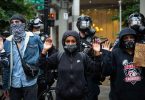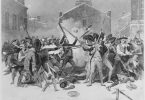By Shannon Golden
BU News Service
Boston University’s Students for Justice in Palestine along with Umoja, BU’s Black Student Union, hosted a panel discussion Wednesday night titled, “Imprisonment of a People: From the U.S. to Palestine, to Boston University and the Greater Boston Community.” The event was meant to explore connections between the Palestinian liberation movement in Israel as well as the Black Lives Matter movement in the United States.
The panel was made up of four speakers led by Shaun King, a Black Lives Matters activist and writer for the New York Daily News. Along with King was clinical teacher educator Yamila Hussein, Attorney Oren Nimni, and ACLU Attorney Carl Williams.
The event, hosted at BU’s School of Law auditorium, quickly filled up and an overflow room was needed. The event was expected to be standing room only, which caused people to arrive as early as 5 p.m. for the scheduled 7 p.m. panel discussion.
Before the speakers were introduced, the music video “To Be an Arab” played while trivia about the Black Panther Party, Malcolm X, the black community in Boston and the Palestinian conflict appeared on the projector.
Event organizers kicked off the night by calling for a moment of silence to honor those who have died in police-involved shootings. Leaders in Students for Justice in Palestine and Umoja then began to ask questions to direct the panel discussions.
Speakers opened with the topic of the 13th Amendment and how mass incarceration within the U.S. focuses on prison slavery. Speakers then began to discuss how white supremacy is built into the legal framework. This allowed for a transition into the rest of the night that primarily focused on white supremacy and how blacks in the U.S. and Palestinians both suffer from oppression.
Panelists discussed how Israel and the U.S. are similar in that they are predicated on the elimination of the native people. They continued by saying the only way for natives to survive is to be “invited into whiteness,” or elimination by death or incarceration.
“The idea of whiteness is the most deadly thing to ever be created in the United States of America,” Carl Williams said. “This is grounded by a system of white supremacy.”
Yamila Hussein, a native of Palestine, spent most of her time comparing Palestinians to black Americans.
“We and the black people have the same resume,” Hussein said. “We are born criminals; we have the same schooling opportunities.” She discussed growing up in Palestine and feeling comfort in knowing her black brothers and sisters had her back.
“We love black people, even when they are American,” Hussein said.
Throughout the night, speakers discussed connections between Israel and the United States, as well as blacks and Palestinians.
“I think it is really easy to look at the U.S. and Israel,” Nimni said. “They are authoritative and fascist states.”
The major theme of the night was that there cannot be a black liberation without Palestinian liberation. Speakers called this idea “one struggle.”
Hands shot up around the room when the discussion was opened up to the audience for questions. Most questions were aimed at how to deal with white supremacy and racism within the U.S. The one question that got the most attention came from an 8-year-old girl who asked, “Why are policemen killing people?”
“We have three problems in why police do what they do,” King said addressing the young girl. “We have way too many guns in this country, we are the only country in the world that has more guns than people, and because we have more guns than people, police use the excuse of there being too many guns for why they always kill people.”
King continued with his response by saying, “Police shoot people because they are allowed to.”
“They should not be allowed to shoot people the way they are, whenever we allow people to do horrible things, guess what, they do them. In this country our police are allowed to shoot people in ways they aren’t allowed in other countries,” he said.
Throughout the night there was constant clapping and snapping after well-received points were made. When the final question was answered, the speakers received a standing ovation from the audience.
“I think it is really important to care about these social justice issues,” Dima Thabit, a BU graduate student said, “We are basically living during the civil rights movement.”





